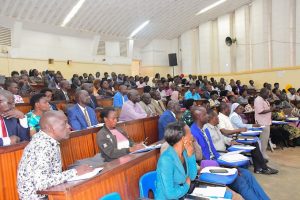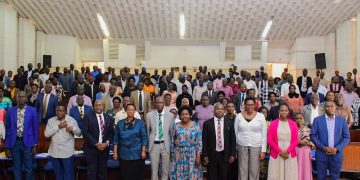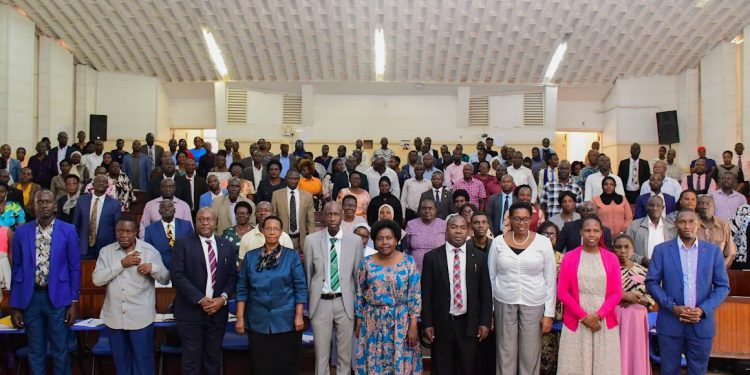Makerere University, in partnership with the Ministry of Education and Sports (MoES), Friday, September 19, 2025, convened a high-level Early Childhood Care and Education (ECCE) Policy Awareness Workshop to strengthen the training, professional development, and regulation of Uganda’s early childhood education workforce.
The workshop brought together over 250 stakeholders, including policymakers, teacher educators, school proprietors, and representatives from training institutions.
Opening the workshop, Professor Anthony Mugagga, Principal of Makerere University College of Education and External Studies (CEES), highlighted the critical role early childhood education (ECE) plays in national development. “Early childhood education is key in Uganda; it is part of us,” he said, emphasising that Makerere University remains committed to supporting the sector through training and capacity-building initiatives.
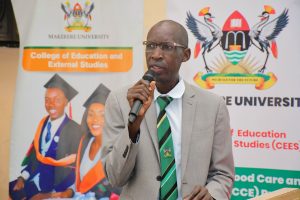
Prof. Mugagga noted the growing demand for ECE training in Uganda, surpassing initial expectations. While the College initially targeted diploma holders for the new Bachelor of Early Childhood Education (ECE) program, applicants with only Advanced Level (A-level) qualifications showed overwhelming interest.
The first advertisement for the bachelor’s program attracted 500 applicants, yet only 110 students could be admitted. The second advertisement drew 1,000 applicants, of whom only 120 could be accommodated. Similarly, the Master’s program received 100 applications, with only 10 admitted.
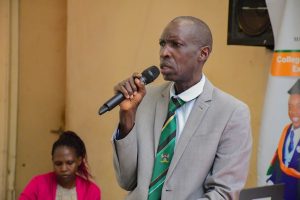
“To address this demand, Makerere University is appealing for funding to establish a dedicated building or centre for ECE and to expand staff structures to accommodate more educators,” Prof. Mugagga said.
He further announced plans to introduce a taught PhD in Early Childhood Care and Education next academic year, complementing the current research-based PhD.
Strong Foundation
Dr Annet Mugisha Kajura, Acting Commissioner for the Teacher Education and Training Department (TETD) at MoES, framed teacher training as the foundation of quality education.
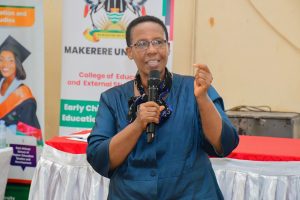
Using the metaphor of a forest and its young trees, she explained that without well-trained and motivated teachers, the education system cannot thrive. “A strong building cannot stand without a solid foundation; in education, teachers are that foundation,” Dr Kajura said.
Dr Kajura outlined the objectives of the workshop: strengthening partnerships between the Ministry, training institutions, and stakeholders; enhancing coordination for better teacher training outcomes; raising awareness of ECE standards and policies; identifying gaps in professional development; and laying strategies for accreditation, certification, and online registration for pre-primary teachers.
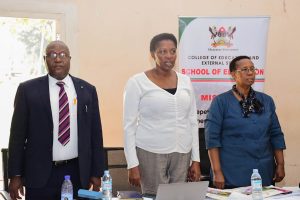
“Teacher training institutions must prioritise quality over profit, follow approved training frameworks, and uphold high ethical and professional standards,” she underscored.
Dr David Kabugo, Deputy Director at the Makerere Institute of Teacher Education and Research (MITER), presented an issues paper on repositioning ECE teacher training and development in Uganda.
Dr Kabugo highlighted policy-practice gaps, fragmented governance, low qualifications among ECE educators and the limited human resource capacity in Uganda’s ECE sector, noting, “Uganda has only a few professors and associate professors specialising in ECE, with limited numbers of PhDs and Master’s, creating a ‘triangular distribution’ of expertise that undermines the quality of teacher preparation.”
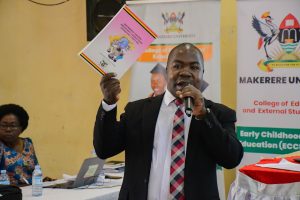
He emphasised the need for systemic improvements, stating, “Professionalising ECE requires structured career pathways, statutory enforcement, and investment in human resources to ensure sustainable and high-quality teacher training,” and urged stakeholders to close policy-practice gaps and strengthen coordination across institutions.
Regulatory Compliance
Elizabeth Kisakye Nsamba, Principal Education Officer for ECD Teacher Education and Training at MoES, emphasised the importance of regulatory compliance, insisting, “No institution should offer teacher training without government approval and affiliation.”
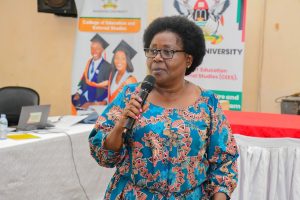
She outlined key institutional requirements, including adequate infrastructure, demonstration schools for practical teaching, digital readiness, qualified staff, and adherence to health and safety standards.
“We are in a transitional period toward full implementation of the National Teacher Bill and the establishment of the National Teacher Council, and public-private partnerships are crucial to ensuring compliance and quality,” Nsamba highlighted.
Fatuma Isabirye, TMIS Consultant at MoES, demonstrated the online Teacher Management and Information System (TMIS) for pre-primary teacher registration. She explained, “The system streamlines verification, certification, and record-keeping for educators across the country.”
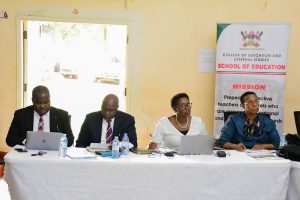
Isabirye emphasised that teachers and institutions must submit authentic graduation lists and academic credentials to ensure transparent registration and prevent fraud.
Strong Collaborations
Dr Muwonge Vincent from Makerere University’s Institute of Teacher Education and Research called for stronger collaboration between universities and training institutions to enhance teacher education through professional development, research, and innovation.
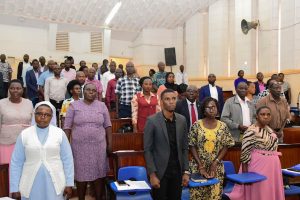
He remarked, “Mentorship, competency-based assessments, and inclusive capacity-building initiatives are crucial to ensure no teacher educator is left behind.”
Closing the workshop, Hajat Safina Mutumba, Assistant Commissioner in charge of Pre-Primary Education at MoES, reflected on the central role of teachers in implementing curricula and policies.
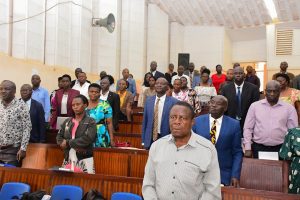
She highlighted the government’s plans to expand nursery education in government primary schools and noted, “A prepared and well-trained workforce is essential for successful implementation.”
“Teachers should embrace professional development opportunities and remain adaptable to new policies and emerging demands in the education sector,” Safina encouraged.
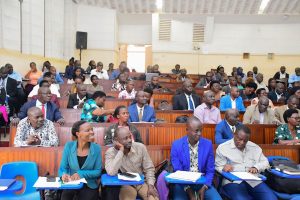
Agreed actions include committing to building a support team and ensuring coordination and collaboration before taking any operational steps. Institutions will follow an approved training framework to maintain quality and standardise teacher education.
The workshop underscored a unified commitment to raising the quality of early childhood education in Uganda. Key outcomes include the urgent need for infrastructure investment, expanded staffing, improved professional development, and regulatory compliance across all ECE institutions.
